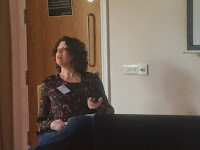For our series of posts by experts-by-experience, Krista Marie Mills (pictured above) is exploring the 'positive side' of mental illness. Krista has blogged for the Huffington Post, Anxiety United, and Bring Change 2 Mind about her experiences. She has her own blog too, Loosening the Chains: Life with Anxiety and Depression.
However, despite the given ‘title’, what I can now say is that mental illness has made me strive for more. Before falling ill I had lost all direction. My assignment grades were not reflecting my true ability, and I was skipping lectures due to hangovers and wanting to spend time with my friends. That has all changed now though as I graduated with honours last July, and am now working towards my Psychology Research Masters Degree. I have never been more focused and determined, as my dream now is to pursue my PhD and become a published author and Cognitive Behavioural Therapist - something I never would have considered before experiencing and living through the disorders.
Without becoming ill I would also have missed out on the opportunity to meet a number of amazing people, and form closer bonds with those already in my life. I transferred courses due to my dwindling grades, and it was then that I made a few genuine life - long friends, and built up a new support system. They say that people come into our lives for a reason, and I am now a firm believer of that. It is because of their support I can now take great pride in the fact that I am a much stronger person - an essential quality when dealing with the effects of mental illness. Before, I was, well, a ‘doormat’. I lacked the ability to voice my opinions and stand my ground, allowing my then friends and strangers to speak over me and sometimes treat me very poorly. This has all changed though as, while I remain a caring and compassionate person, I live by the motto that I am in enough emotional and psychological pain, why should I empower others to add to that?
So, yes, mental illness has turned my world upside down. It has left me isolated, constantly detached, scared of people, and scared of leaving my home. To take some of the control back though, and of course when I can think rationally, I do like to believe that a higher force, my guardian angel maybe, has set me this ‘challenge’ as a means of steering me in the right direction, ensuring that I am destined for bigger and better things as opposed to where I was headed. It helps.









